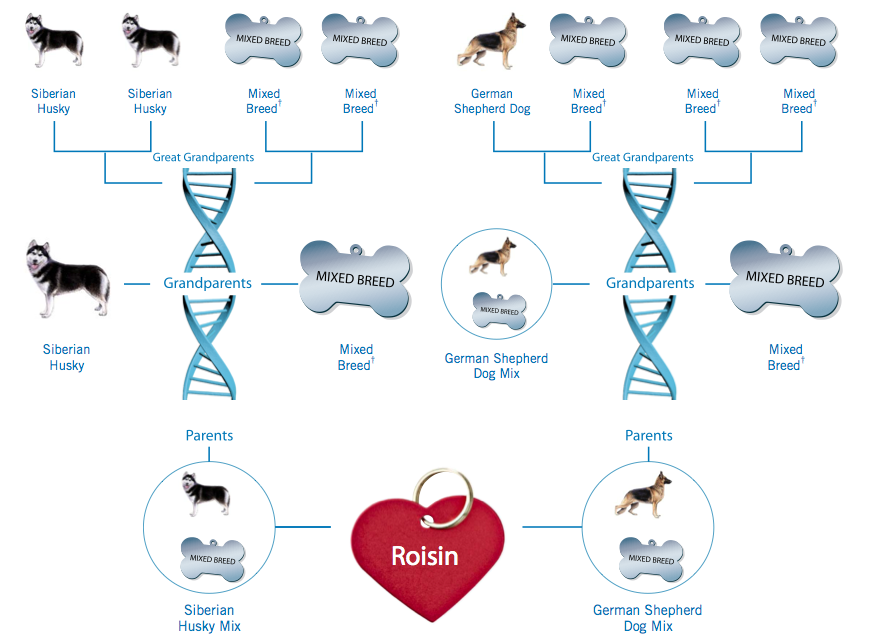Your dog’s DNA may unlock the mysteries of their breed makeup and highlight potential health risks. Genetics play a distinct role in health, lifespan, personality, and so much more. Most pet owners are naturally curious about their lovable mutt’s predecessors. Do they have unusual breeds in them or breeds that put them at risk for health conditions?
Many dog owners (as well as veterinarians) are interested in the growing field of dog genetic testing. Frequently questions that dog owners ask about dog DNA tests relate to their accuracy and complexity. There are many variables in what your dog’s DNA reveals, and the DNA test kits range in reliability as well as price.
To go into greater depth on this popular subject, Dr. Jenna Corbett here at Union Lake Veterinary Hospital will focus on one popular genetic test, the Wisdom Panel. She will also cover how these tests work, what they look for, and how testing can benefit both veterinarians and their dog patients.
A Closer Look at the Wisdom Panel
The Wisdom Panel is one of the more popular dog DNA tests available, with a good measure of respect among pet owners and veterinary professionals. It can lead to confusion, though, about why certain breeds show up in results, when other anticipated breeds did not. This is one of the chief challenges that dog owners who use these tests face – “What does the test actually mean for my dog?”
The Wisdom Panel 2.0 Breed Identification test, manufactured by Mars Veterinary, analyzes a DNA sample from your dog. It requires you to swab the inside of your dog’s cheek to collect cells. There is also a form to fill out about your dog along with your contact information. After you mail the sample, results usually arrive within a few weeks. The test will tell you the percentage of breeds that comprise your special dog.
Dog owners can purchase the Wisdom Panel dog DNA kit online. It analyzes your pet’s DNA against roughly 200 breeds of dogs in their database.
Mars has a second test on the market: the Royal Canin Genetic Health Analysis (formerly known as the Wisdom Panel Professional DNA Test). The Genetic Health Analysis requires assistance from your veterinarian because it needs a blood draw. This test analyzes your dog’s DNA against 250 breeds and the test also analyzes your dog’s risk of certain diseases.
F1 Cross…What?
When we spoke to genetics researchers for Mars Veterinary, their dog DNA tests are 90% accurate based on something called the “F1 Cross”. That is excellent compared to some of the genetic tests on the market. It is important to buy a test that will give you accurate answers.
By “just guessing” the breeds that make up a dog by observing their physical characteristics, you would have a roughly 25% accuracy rate. That’s surprisingly good but far from the 90% accuracy of the F1 Cross results.
What is an F1 Cross? To be technical for a moment, the F1 Cross is when purebreds are bred to other purebreds. When you breed two purebreds you would think the results should be 100% accurate, right? But, during the process of development between sperm and egg, DNA can get swapped and result in different genetic codes. This complex process is known as meiotic recombination and is nature’s way of keeping us on our toes. Mother Nature definitely has surprises up her sleeves.
Your Dog’s DNA Test Results
If the 90% accuracy relates primarily to purebreds, how does that help you figure out your mutt’s lineage? We believe that for every new breed introduced into your dog’s DNA composite, the level of accuracy in breed results decreases. We don’t know what percentage of accuracy we can expect, but we are sure it is more reliable than the 25% visual assessment.
Dr. Corbett decided to run tests based on her dog, Roisin, a large, red, short-haired dog adopted from a shelter in Detroit. We assumed Roisin was a Husky mix. Based on the photo, what do you think?
There is, of course, some Husky in her, but you’d be surprised about the rest. We also guessed Labrador Retriever. Check out the results for Roisin. Did you guess any of these breeds?



In determining your dog’s pedigree, genetic testing is only one of the tools you have available in your toolbox. Ideally, you would know what their mother and father looked like. What did their siblings look like? Are there behaviors and health conditions occurring in their family, or down the line? A little research or knowledge on your part can help you get a more complete picture of your pup’s pedigree.
Our suggestion is to not rest on a single test. If possible, try more than one and compare the results. How many discrepancies are there?
Advances in Veterinary Medical Genetics
Humans are fascinated by the origins of our families. Exploration in human genealogy and genetics continues to gain popularity. There are already a wide array of human ancestry tests available online and in most big box stores. You may have even looked at your own ancestry.
Human medicine has used these tests to help analyze the risk of different diseases and conditions. Over the past 25 years, veterinary medicine has also embraced medical genetics as a tool in discovering potential health issues in dogs. The more we know about a dog’s likelihood of developing health conditions that are common to specific breeds, the more effective we can be in managing them to keep your furry friend healthy and happy.
Genetic testing can now predict a pet’s predisposition to numerous genetic diseases, like cancer. New treatments are also being discovered, such as osteosarcoma (bone cancer) treatments. And testing is launching new studies such as the melanoma ‘vaccine’ studies in dogs. It’s exciting to know that there are over 250 known genetic tests for cats and dogs, and many more are emerging.
The benefits of these medical tests can positively impact breeding practices and give pet owners insight into possible diseases their four-legged friends are likely to develop. It also allows us as veterinary professionals to increase the quality of care for our beloved pet patients. The future is indeed bright for the advancing of pet genetic testing. Just don’t panic if you find risks in your dog’s test results. Regular examinations and diagnostic testing as well as discussing the results with your veterinarian give us the big picture view when analyzing DNA test results.
Benefits of Dog DNA Tests
Regardless of the limitations in dog genetic testing, there are great advantages to knowing what your dog is made up of.
- Understanding and preventing potential health problems that are common to certain breeds
- Knowing how big a puppy might become
- Anticipating average lifespan
- Learning about personality traits common to some breeds
- Proving pedigree
Of course, one of the biggest benefits of dog DNA testing is that it’s fun. It’s wonderful to know more about your best friend. Genetic testing can be a great asset in discovering who they are and why they behave in certain ways.
The team at Union Lake Veterinary Hospital is excited about developments and breakthroughs in pet DNA testing. We hope this guide to pet genetic tests gives you a better understanding and knowledge of these amazing advances in truly understanding our furry friends.
If you would like more about dog DNA tests, or would like to schedule an appointment, please call us or book online.

